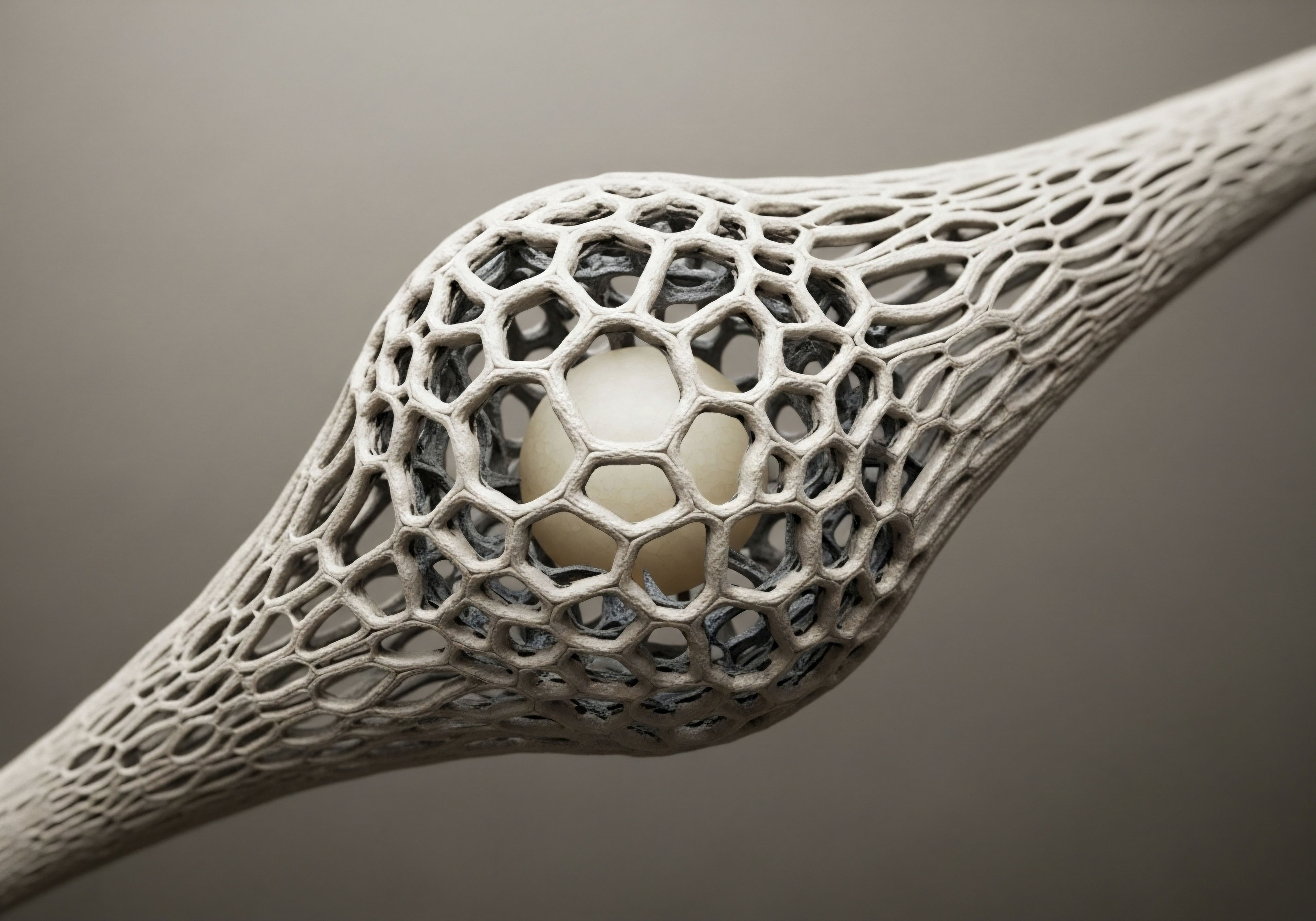

The Biological Imperative for Nightly Renewal
Your biology operates on an intricate, ancient timetable, a master clock governing everything from cellular repair to peak cognitive function. The nightly biological reset is not a passive state of rest; it is the body’s paramount performance optimization period. This nightly recalibration is the bedrock upon which sustained vitality, sharp intellect, and enduring physical prowess are built.
Neglecting this fundamental biological process is akin to expecting a high-performance engine to run indefinitely without essential maintenance. The consequences manifest as diminished energy, compromised metabolic health, and a subtle, yet persistent, erosion of your biological capital.
During the quiescent hours of sleep, your endocrine system orchestrates a symphony of hormonal recalibrations. Growth hormone (GH), crucial for tissue repair and muscle synthesis, surges during deep sleep stages, initiating the body’s restorative protocols. Melatonin, the master regulator of the sleep-wake cycle, signals the body to enter a state of profound repair and recovery.
Cortisol, the primary stress hormone, naturally dips to its lowest point, allowing the body to disengage from the fight-or-flight response and focus on recuperation. This precise hormonal choreography is essential for maintaining metabolic equilibrium, influencing glucose regulation, insulin sensitivity, and appetite control. Without this nightly hormonal reset, the delicate balance of these systems is disrupted, paving the way for chronic health issues such as obesity, insulin resistance, and metabolic syndrome.
The implications extend directly to your cognitive and physical performance. Optimal sleep quality facilitates memory consolidation, enhances learning capacity, and sharpens focus. Your brain clears metabolic byproducts that accumulate during waking hours, a process vital for preventing neurodegenerative decline. Physically, the nightly reset is when muscle fibers repair, immune function is bolstered, and energy stores are replenished.
Athletes and high-achievers understand that performance is not solely dictated by daytime training or nutrition, but profoundly by the efficiency of their overnight biological restoration. The body’s ability to recover and adapt is directly proportional to the quality and depth of its nightly renewal.
Circadian disruptions are associated with numerous pathological conditions such as premature mortality, obesity, impaired glucose tolerance, diabetes, psychiatric disorders, anxiety, depression, and cancer progression, whereas short-term disruptions are associated with impaired wellness, fatigue, and loss of concentration.
Understanding this fundamental biological imperative sets the stage for proactive optimization. The nightly reset is the body’s inherent mechanism for self-renewal, a powerful tool that, when understood and leveraged, becomes the cornerstone of peak human performance and longevity.


The Mechanics of Overnight Biological Recalibration
The intricate machinery driving your nightly biological reset is a testament to evolutionary design, centered around the circadian clock and its profound influence on hormonal signaling. At the core of this system lies the suprachiasmatic nucleus (SCN) in the hypothalamus, your body’s master timekeeper, which synchronizes internal biological rhythms with the external environment, primarily through light cues.
This central clock orchestrates the rhythmic secretion of hormones and influences peripheral clocks in tissues throughout the body, ensuring a coordinated daily physiological cycle.

The Hormonal Symphony of Sleep
During the nocturnal phase, a precise cascade of hormonal events unfolds, each playing a critical role in restoration and optimization ∞
- Growth Hormone (GH): The most significant surge of GH release occurs during the initial hours of deep sleep (slow-wave sleep, SWS). GH is fundamental for cellular repair, muscle protein synthesis, bone growth, and metabolic regulation, acting as a key anabolic agent for overnight tissue regeneration.
- Melatonin: Produced by the pineal gland in response to darkness, melatonin signals the onset of the sleep period and helps regulate the sleep-wake cycle. Its presence facilitates the transition into restorative sleep stages and influences other hormonal rhythms.
- Cortisol: While often associated with stress, cortisol exhibits a robust circadian rhythm, with levels naturally peaking in the early morning to prepare the body for wakefulness and activity. During sleep, its levels are at their lowest, enabling stress hormone reduction and promoting an anabolic state.
- Leptin and Ghrelin: These appetite-regulating hormones also follow circadian patterns. Leptin, which signals satiety, tends to peak at night, while ghrelin, which stimulates hunger, is typically lower during sleep. This balance is crucial for metabolic homeostasis and energy balance.
- Sex Hormones: Testosterone and other sex hormones also exhibit diurnal variations, with testosterone levels often peaking in the early morning. Their regulation is intertwined with sleep quality and circadian timing.
The disruption of these hormonal rhythms due to poor sleep, shift work, or other lifestyle factors can lead to significant metabolic dysregulation, including impaired glucose tolerance and insulin resistance.

Peptides ∞ The Advanced Modulators of Biological Rhythms
Beyond the body’s endogenous hormonal system, emerging science points to the sophisticated role of peptides in fine-tuning these nightly resets. Peptides, short chains of amino acids, act as potent signaling molecules that can influence hormonal release, cellular repair, and sleep architecture.
For instance, Delta Sleep-Inducing Peptide (DSIP) has been studied for its ability to promote deep, delta-wave sleep, the most restorative stage associated with memory consolidation and physical recovery. Combinations like CJC-1295 with Ipamorelin are designed to stimulate GH release, mirroring the natural nocturnal surge and enhancing tissue repair and metabolic balance. These peptides are not sedatives; they function as biological regulators, supporting the body’s intrinsic mechanisms to achieve deeper, more restorative sleep and optimize hormonal output.

The Molecular Clockwork
At the cellular level, a network of “clock genes” (such as BMAL1, CLOCK, PER, and CRY) oscillates to generate these circadian rhythms. These genes regulate transcription and translation processes, ensuring that cellular functions, including hormone synthesis and metabolic pathways, are timed appropriately throughout the 24-hour cycle. Disruptions to these clock genes, often induced by environmental factors or lifestyle choices, can cascade into widespread physiological dysfunction.
| Hormone | Primary Role in Nightly Reset | Impact of Disruption |
|---|---|---|
| Growth Hormone (GH) | Tissue repair, muscle synthesis, cellular regeneration during deep sleep. | Impaired recovery, reduced muscle mass, slower healing. |
| Melatonin | Regulates sleep-wake cycle, signals darkness for rest and repair. | Sleep onset latency, fragmented sleep, altered circadian timing. |
| Cortisol | Lowest levels during sleep, facilitates stress reduction and anabolic processes. | Elevated stress, impaired recovery, disrupted metabolic regulation. |
| Leptin/Ghrelin | Appetite regulation; leptin peaks at night for satiety, ghrelin is low. | Increased hunger, dysregulated food intake, metabolic syndrome risk. |
This complex interplay of circadian timing, hormonal signals, and sleep architecture forms the foundation of the nightly biological reset, a sophisticated process essential for maintaining peak physiological function.


Timing Your Biological Recalibration for Peak Output
The efficacy of your nightly biological reset hinges on synchronicity ∞ aligning your lifestyle with your inherent circadian rhythms. This synchronization is not merely about achieving a specific number of sleep hours; it is about the quality, timing, and consistency of your rest, which directly influences hormonal balance and metabolic health. Modern life, however, frequently throws this delicate system out of alignment, creating a state of chronic biological desynchrony that undermines vitality.

The Cost of Chronodisruption
The pervasive influence of artificial light, irregular work schedules, and constant digital stimulation significantly disrupts the body’s natural circadian timing. Shift work, in particular, is a potent disruptor, leading to reversed melatonin and cortisol rhythms, impaired glucose and lipid homeostasis, and a higher risk of metabolic syndrome.
Even less extreme deviations, such as inconsistent bedtimes or exposure to blue light late at night, can blunt melatonin production and delay sleep onset, thereby compromising the critical hormonal surges and repair processes that occur during the early phases of sleep.
This chronodisruption has tangible consequences. It can lead to reduced insulin sensitivity, increased appetite, and a propensity for fat storage, directly impacting body composition and long-term metabolic health. Furthermore, the impaired hormonal regulation associated with poor sleep quality affects mood, cognitive function, and immune response, creating a cascade of negative health outcomes.

Optimizing Your Nightly Reset ∞ Strategic Interventions
Re-establishing robust circadian alignment and optimizing your nightly reset requires a strategic, multi-faceted approach. The timing of your actions throughout the day is as critical as the sleep itself.

Foundational Pillars of Circadian Alignment
Light Exposure: Maximizing natural light exposure in the morning and early afternoon helps anchor your SCN to the solar day. Conversely, minimizing bright, especially blue, light exposure in the hours leading up to bedtime is paramount for facilitating melatonin production.
Feeding Windows: The timing of food intake significantly impacts metabolic rhythms. Aligning your eating patterns with your circadian clock, often by restricting your eating window to daylight hours, can enhance insulin sensitivity and metabolic efficiency.
Movement and Exercise: Regular physical activity supports robust circadian signaling. However, the timing of intense exercise matters; strenuous workouts too close to bedtime can elevate cortisol and body temperature, interfering with sleep onset.

Advanced Optimization with Peptides and Hormonal Support
For individuals seeking to elevate their biological reset beyond foundational practices, targeted interventions can be highly effective. Peptide therapy offers a sophisticated avenue for enhancing specific aspects of the nightly recalibration process.
Peptides like DSIP can directly support the induction of deeper, more restorative sleep stages. Growth hormone secretagogues, such as CJC-1295 with Ipamorelin or Sermorelin, can be utilized to augment the natural nocturnal GH surge, thereby amplifying tissue repair and metabolic benefits.
These interventions are most effective when implemented with a deep understanding of individual physiology and in conjunction with optimized lifestyle factors. The goal is not to override natural processes but to precisely support and enhance them, ensuring your biology is tuned for peak performance.
Hormone replacement therapy, when clinically indicated and expertly managed, can also play a role in restoring hormonal balance that supports optimal sleep and metabolic function, particularly in cases of age-related decline or specific endocrine imbalances.
The “when” of biological recalibration is not confined to the night; it is a continuous, 24-hour process. By strategically managing light, nutrition, movement, and sleep, and by employing advanced peptide or hormonal support where appropriate, you actively engineer a superior nightly reset, unlocking profound improvements in vitality, performance, and long-term health.

The Vitality Architect’s Decree ∞ Master Your Biological Clock
The nightly biological reset is your body’s most potent performance enhancer, a non-negotiable system for optimal function. Embrace the science of circadian rhythms and hormonal choreography. Synchronize your life to your internal clock through strategic light management, precise nutritional timing, and dedicated sleep hygiene.
For those seeking to transcend the ordinary, advanced peptide therapies offer precise recalibration of sleep architecture and hormonal output, amplifying your body’s innate regenerative power. Master this fundamental biological process, and you unlock a new echelon of vitality, cognitive acuity, and physical resilience. This is not merely about sleeping better; it is about living at your biological peak.

Glossary

nightly biological reset

cellular repair

metabolic health

endocrine system

growth hormone

the nightly reset

sleep quality

nightly reset

nightly biological

melatonin

circadian timing

tissue repair

circadian rhythms

biological reset

peptide therapy




